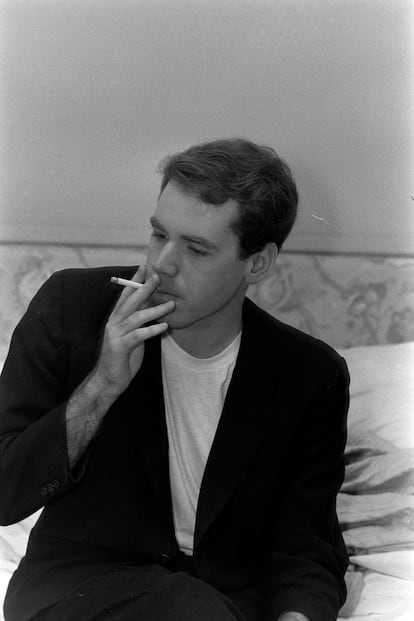Why are Gen Z men obsessed with Patrick Bateman from ‘American Psycho’?
The fictional character, who is opportunistic, misogynistic and consumerist, seems to strike a chord with a generation that has embraced him as a symbol and a role model

Ever since American Psycho appeared, first as a controversial novel published by Bret Easton Ellis in 1991 and later as a 2000 film directed by Mary Harron and starring Christian Bale, it seems like the character of Patrick Bateman has always been had a presence in the Western cultural imagination. Never mind his murderous side: he is a yuppie, an opportunist, a misogynist, a drug addict and a consumerist – a reflection of so many things that are wrong in the world. More than a character, he is practically a symbol.
However, his image has not always been seen as a parody of ultra-capitalism. At times, Bateman has also been a role model, devoid of any irony. An example of this would be the gym junkies who are obsessed with achieving Bateman’s muscular and sinewy body, a difficult challenge that forced Bale himself to undergo an incredibly strict diet and a severe workout routine. At the beginning of 2020, a YouTuber named Will Tennyson underwent the same routine as Bale to achieve it. Even Men’s Health, the bible of ideal male bodies, warned its readers: “We don’t recommend that you try this yourself.” It was right then, in 2020, when Bateman conquered a new generation who, in full confinement, saw themselves reflected in him – without a hint of irony, in most cases. But first, a little history.

An investment banker as a metaphor
The novel is presented as a first-person account in which, with a devilish, hyperactive and repetitive style, we have first-class seats to the inner workings of the mind of a late-1980s Wall Street investment banker who is also, possibly, a serial killer. We get to see all his fixations, hatreds and obsessions: Armani suits, cocaine, Brooks Brothers shoes, fancy business cards, trendy restaurants, his daily beauty routine and the band Huey Lewis. His horrible crimes against men and women are described without sparing a single detail, which could be the reason why the novel became so famous (or infamous).
The fact that the world around him laughs or even acts complicit when the protagonist confesses his crimes makes this story one of the best critiques of the depravity of the business world. Because this is how Bret Easton Ellis meant his book to be understood: as a great metaphor.
A sexagenarian comes to TikTok
Today, Bateman would be about 60 years old (according to the story, he was born in 1962). He would probably regard TikTok with suspicion, as some youthful nonsense. However, he was popular on the internet from the onset, reaching fame in forums and social media, on platforms such as 4chan or TikTok. And in the first weeks of the 2020 coronavirus lockdown, a series of Patrick Bateman memes quickly began to circulate: Bateman walking while listening to music on his Walkman, talking on a huge wireless phone while exuding self-confidence, with a shiny ax in his hand or having sex while looking at his muscular body in a mirror.
In those days of confusion and bewilderment, Patrick Bateman became, for many, synonymous with the purest masculinity, with militant capitalism, with some sort of ideal man. In this sense, the character fit perfectly into the archetype of the sigma male, a concept similar to that of the alpha male and which, according to Günseli Yalcinkaya’s article in Dazed magazine, is “the latest socio-sexual identity to take over the internet,” especially among young men. The term refers to a guy who, unlike the alpha, lives on the fringes of society, oblivious to the conventions of our environment, but who is equally powerful.
Millions, frustrated with a world that seems bent on making things difficult for them (to the point of preventing them from leaving the house, during the pandemic), feeling misunderstood and relegated but still eager to feed their egos, have embraced the ideal of the sigma male, which allows them to exist as the antithesis of the alpha males, the popular guys from school, the ones who used to ridicule them.

The sigma in confinement
How do Bateman and American Psycho fit into all of this? As journalist Shaurya Singh wrote in the newsletter The Digital Native, Bateman’s main characteristics – his sexual insecurity, insensitivity, shallowness and obsession with money – connected with some of the obsessions of Generation Z (and plenty of other generations) during the pandemic.
Those days, both media and social networks continued to be dominated by the obsession with sex, beauty, money and comparing oneself with others. But the pandemic and the lockdown multiplied their effects. Those shots of Patrick Bateman gazing vainly in the mirror, be it coming out of the shower or while having sex with a woman, are not too far from the kind of videos one can see today on OnlyFans, a platform that revolutionized the way in which pornographic material is produced and consumed, creating a new kind of narcissistic eroticism. During the pandemic, its revenue increased by 553%.
A chaotic tribe
Perhaps what contributed most to the non-ironic use of the Bateman character (which, as previously stated, was created as a parody), was the obsession with money. During the pandemic, many were seeing their sources of income dwindle or disappear completely, and making money, preferably quickly and from home, became the priority of those who did not hesitate to embrace the crypto bro philosophy. In record time, this mantra flooded social media with its martial and illogical optimism. Investing in these risky assets became almost a form of religion.
For many, Patrick Bateman is no metaphor. These worshipers do not care if his creator’s goal was to ridicule or represent in the crudest possible way precisely what they glorify. Bateman, for them, belongs to a gallery of idols that, as journalist Brad Esposito explained in an article for the Australian edition of Vice magazine, also includes Tyler Durden from Fight Club, Joaquin Phoenix’s Joker and Jordan Belfort from The Wolf of Wall Street. Guys who are outside the system and play “by their own rules,” broken toys on the fringes of society, in an endless battle against a world that is alien and hostile to them.
These Patrick Bateman worshipers are a chaotic tribe that includes everyone from modern stoics to gym freaks, guys obsessed with controlling their habits, militant misogynists, internet trolls, regulars of 4chan or Reddit, anti-wokes, far-right voters and staunch critics of Marvel’s attempts to diversify its audience. These are the people who are using Bateman’s image to represent themselves, without giving a second’s thought to the true intentions of Ellis, who, in a display of intelligence and irony, saw what was coming before anyone else.
Sign up for our weekly newsletter to get more English-language news coverage from EL PAÍS USA Edition
Tu suscripción se está usando en otro dispositivo
¿Quieres añadir otro usuario a tu suscripción?
Si continúas leyendo en este dispositivo, no se podrá leer en el otro.
FlechaTu suscripción se está usando en otro dispositivo y solo puedes acceder a EL PAÍS desde un dispositivo a la vez.
Si quieres compartir tu cuenta, cambia tu suscripción a la modalidad Premium, así podrás añadir otro usuario. Cada uno accederá con su propia cuenta de email, lo que os permitirá personalizar vuestra experiencia en EL PAÍS.
¿Tienes una suscripción de empresa? Accede aquí para contratar más cuentas.
En el caso de no saber quién está usando tu cuenta, te recomendamos cambiar tu contraseña aquí.
Si decides continuar compartiendo tu cuenta, este mensaje se mostrará en tu dispositivo y en el de la otra persona que está usando tu cuenta de forma indefinida, afectando a tu experiencia de lectura. Puedes consultar aquí los términos y condiciones de la suscripción digital.








































